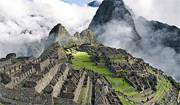The tropical forests in eastern Peru’s Lower Urubamba Region are some of the most species-rich and biologically diverse forests in the world. The more than 600 bird species alone make this a hotspot of diversity.
The region is also the focus of a number of development projects—which can carry implications for many kinds of life. Conservation biologist Alfonso Alonso leads the Biodiversity Monitoring and Assessment Program of the Smithsonian Conservation Biology Institute, which monitors selected species and habitats found in several mountain ranges and 14 ecological landscapes. The program investigates the effects of development and how to conserve and protect those species and habitats while contributing to sustainability.
Alonso highlights studies in ocelots and primates aimed at understanding their biology and how these animals cope with development projects. He also discusses the 250-mile-long pipeline that transports natural gas from the eastern foothills of the Andes to the Pacific coast and the ecological challenges it presents.
Other Connections

Learn more about Legendary Peru on tour—World of the Inca and Machu Picchu.
Visit the Smithsonian Journeys page to see more
exotic trips.
To learn more about Peru, listen to clips from
Smithsonian Folkways>>